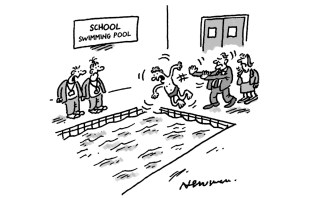The feverishness of the private prep-school market in London has reached such a pitch that children in the nursery class at Eaton House Belgravia are being prepared for the seven-plus from the age of two.
‘Some of them are still in nappies, and some of them still need a nap,’ the headmaster Ross Montague tells me. ‘We have folding camp beds, and our lovely nursery team of six teachers deal with that.’
While seeming to be kind to each other, these parents are in fierce competition
Montague, an ex-professional footballer who used to play for Brentford before he was injured and then retrained to become an educationalist and school superhead, accepts that the highly demanding assessment processes for Westminster Under School, St Paul’s Juniors and King’s College School Wimbledon are both fair and here to stay, so it’s the school’s job to prepare children for them from as early an age as possible, ‘in a responsible manner’.
His aim is to train them not just academically, but in the all-important ‘executive functioning skills’ they’ll need in order to have a chance of succeeding in the second round at those schools, if they’re lucky enough to be called back for a morning of being judged on how they perform in group activities.
‘School from two’ is Montague’s solution to giving the children the long run-up they’ll need. The sooner they start, the better they’ll be prepared to ‘access learning’ when the time comes. So, say your son’s birthday is on 2 September, and Eaton House Belgravia’s term begins on 5 September. Your toddler, just turned two, will be in the bottom class, called ‘the Cubs’, and he will very definitely be ‘at school’, rather than just ‘at nursery’: in a proper classroom with an interactive whiteboard. Each morning, the boys and girls will have a ‘short academic input’, including phonics and number recognition. ‘Some of our children aged three are already competent with subtraction,’ Montague tells me. ‘Children’s brains are like sponges at that age.’
Because of the weird British anomaly whereby privately educated girls tend to change schools at different ages from boys, many of the girls will then sit the four-plus and sail into schools like Francis Holland, while the boys will stay on and sit the tough seven-plus aged six to seven. Eaton House prides itself on getting an impressive number of its boys into London’s top three highly sought-after and heavily oversubscribed boys’ prep schools each year. To get a sense of just how oversubscribed and longed-for (by parents) they are, have a look at the Mums-net ‘seven-plus’ thread from last year. It’s a hotbed of maternal anxiety. Of the 350 to 400 who apply to St Paul’s Juniors each year, 100 are called back for the second round, and just 54 are offered places. At Westminster Under, 60 get called back for second round, for just 22 places. Mothers who call themselves things like ‘Pokemomm’ and ‘SWlondonmum123’ are consumed by worry and stress. ‘How did everyone get on with WUS?’ asks ‘Pokemomm’. ‘We did not get through to the second round.’ ‘It’s a no for us. SPJ said in the email that DS [‘darling son’] was placed in the upper-middle quarter and just missed out on interview.’ ‘None of the boys at our school have got through to the second round of any of the three,’ writes ‘Pokemomm’. ‘Rejection after second stage at KCS,’ writes another. One mother is furious because ‘no one has shared a single tutor contact yet’. While seeming to be kind to each other, these parents are in fierce competition, and clearly don’t want to share their treasure of a tutor.
Often, the mothers write as if they themselves were the candidates doing all the swotting: ‘I am going for King’s and St Paul’s Junior and doing Bond assessment books, regular reading, Exam Papers Plus and Prep Plus classes. Have done a few mock exams too… All the best to all of us on the journey… it’s been tough to say the least.’
The consolatory words given to sons if they were rejected used to be: ‘Don’t worry! If you don’t pass the seven-plus, you can have a go at the eight-plus.’ But this is becoming less and less of a consolation. Schools now take far fewer pupils at eight-plus than at seven-plus: just 18 at eight-plus at St Paul’s Juniors, for example – a tiny number when you consider many of the cleverest boys across London are trying.
And ratcheting up the anxiety for parents, Westminster Under School is going to scrap its eight-plus entry entirely from 2027, at which point they will also start taking girls (those annoyingly sorted, meticulous, focused, mature beings), making entry even more competitive for boys.
School heads try to dissuade parents from entering their sons for these assessments if they feel the boys are not ready or suited to it. The prep schools ask the heads, ‘Is this child sitting the assessment with your support?’ Sometimes they’re not; but the application is directly from the parents to the school, and parents have the right to enter their child for wherever they like.

Montague’s way of dealing with this massive over-demand is to accept the situation, be frank with parents, and simply prepare the pupils as well as he possibly can. It’s not just about starting them aged two on the academic subjects; he assures me ‘we don’t over-teach maths and English’, ‘we’re not hothousing’, and ‘we will not cram anything’, although he doesn’t like to see a child held back by a limiting curriculum, and he believes ‘a happy child is a learning child’. As an ex-professional footballer, he’s un-ashamedly ‘a big believer in high performance and perseverance’.
What he aims to instil in the children from the age of two are the ‘executive functioning skills’ that will help them navigate life and give them a hope of getting into those seemingly impregnable schools. In order to succeed, he explains, they’ll need all three elements of the ‘hierarchy of needs’: first, wellbeing; then the executive functioning skills (which include task initiation, focus, perseverance, time management, meta-cognition and working memory); and then the academics.
To facilitate this, he’s installed a new ‘Innovation and Entrepreneurial Centre’ on the top floor of the school building, where the headmaster’s flat used to be. The children will come into this centre regularly, to improve their executive functioning skills, using all kinds of apparatus, from Lego to VR headsets, and they’ll be doing the kinds of problem-solving group activities they’ll be required to do if they get through to the second round of the seven-plus.
This seven-plus hurdle seems to be chiefly a London nightmare. At more rural bastions of the Aertex shirt, such as Ludgrove, boys still start at the traditional prep-school age of eight, and there’s no entry exam, just a friendly ‘open day’ two years before admission. But more and more, prep schools are choosing to start a new junior year for seven-year-olds, or to open a nursery and a pre-prep school, in order to stay financially afloat as the birth rate plummets and fees soar. Looking at those enormous numbers being entered for the prestigious London prep schools, though, you think: VAT might trim the numbers down a bit, but there will still be easily enough desperate parents who will pay any price to get their sons in.
I spoke to Mark Snell, UK education director for Inspired Education, the profitable company which owns 111 schools across 24 countries, including all the Wetherby schools in London. He was head of maths at KCS Wimbledon when the seven-plus started in the early 2000s, and he helped to design the syllabus. He tells me that the whole thing has become ‘a bit of a game’, played by the three protagonists: the prep schools, who set the exams and try to devise a system which differentiates between over-tutored candidates and the genuinely clever and suitable ones; the pre-preps such as Wetherby pre-prep, who do their best to prepare the boys as best they can, while keeping their well-being a priority; and the tutors, whose career success depends on burnishing their reputations for getting boys in. (Schools can and do advise parents not to tutor their children, but nothing will stop them.)
In the middle of this ‘game’ are the boys, who simply want to live their lives, but find themselves bombarded with non-verbal reasoning papers by their parents. Mark Snell tells me he’ll be sad to see the eight-plus being phased out, if it is: ‘If you don’t have it, it’s harder for the late bloomers – schools will miss out on them if they just offer the seven-plus.’ It’s especially tough for boys born in the summer, who are up to a year younger than those they’re competing against.
As ‘Moonface67’ puts it on Mumsnet, summing up the grim situation: ‘There seems [sic] to be more and more candidates and higher and higher expectations every year. We have done all the usual Bond books.’ Never a restful moment for ambitious mothers, or their hard-worked sons.








Comments